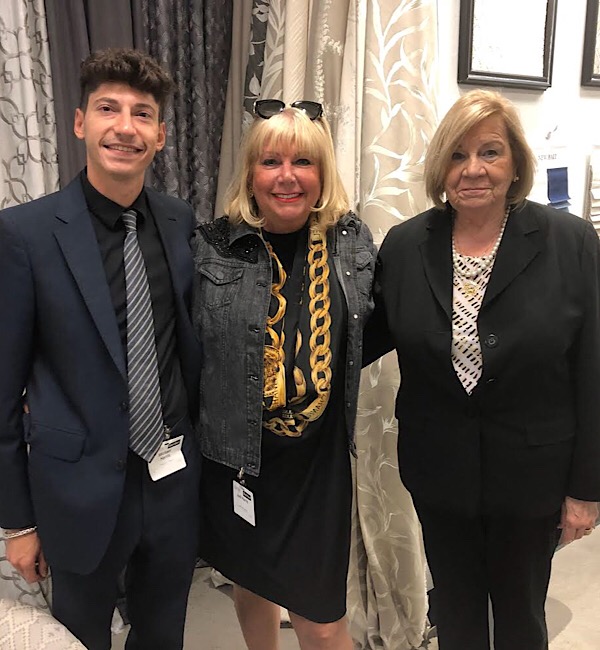Catching Up with Judi Harris of Crestmont Fabrics on Keeping her Husband’s Legacy Thriving
December 18, 2018
By RAY PARKER
HIGH POINT, N.C. -- A little over two years ago, Paul Harris passed away, and his partner in business and life, Judi Harris, had to find a way to keep Crestmont Fabrics going.
Started 35 years ago, the family business continues to be an important resource to jobbers, manufacturers, and converters of sheer drapery fabrics, jacquards, dobby, and multipurpose decorative fabrics, especially prints for contract and residential markets.
There have been changes in the past year, such as expanding into the furniture market and entering high-end sectors. Crestmont has 15 employees at the headquarters in Hauppauge, N.Y. as well as salespeople covering the U.S.

Michael Harris, Judi Harris, and Trudy France of Four Season Decorative Fabrics in Canada during ITA Showtime Market in December.
The following interview was conducted during the ITA Showtime Market on Dec. 2 and edited for clarity. Judi Harris started more than 35 years ago in the garment industry. got into home furnishings with her husband and remains a fabric designer. She reflects on the changing fabric industry, the importance of family and the loyalty of employees as well as soldiering on during difficult circumstances.
How is business the last year for Crestmont Fabrics?
“We’re doing OK, we’re holding our own. We’re exploring new avenues. We’ve touched in the furniture market, which we had a presence in, and we’re looking to expand.”
“It’s hard because we were a company that was primarily only American-made. My husband was big on American-made and we never purchased from China. And I think we have one item that actually comes through Taiwan. But we’ve been successful with doing that. We source anywhere but not from China. Now we [source] in the U.S., Mexico and Turkey, India, Korea. All over the place.”
What other changes have you made in the company?
“Paul and I were always at odds because I always wanted more upper-end, he wanted bread and butter, middle of the road, and that’s what we survived on and made quite a bit of money doing that. Now we’re trying to make a statement with fabrics that look higher-end, and not necessarily priced at the very high end, and we’re competing against big companies. We’re a really little guy and we’re competing.”
What do you attribute to your success?
“It’s an ongoing project here, I mean, we sat back, and we took a look at the company and said, ‘Well, we’re very fortunate.’ We have employees that have been with us for 33 years, and in business for 35. And we basically relied on our employees. They are phenomenal, absolutely phenomenal. I mean we’re a family. I attribute it to them, they helped us.”
How are the family members involved?
“My son is president, Michael Harris. He’s brilliant with numbers, just like his father. And very technology savvy.”
“My husband believed in doing business with a black marble notebook. Everything had to be on paper, and he would drive me crazy, and I would say, ‘We have to computerize,’ and I made us computerize. We were a good team. [Now, there’s tech systems in place.] I can just click a button and know what the daily sales are, what salesman is being productive and who isn’t, and what customers are buying what. It’s all on my phone.”
“My daughter [Cristina Coffey] is doing all the creative work, doing the designing, and I’m sort of overseeing everything because that was my forte. But she’s very good, much better than I was, so I’m blessed, I’m lucky.”
What changes have you seen in the fabric industry?
“I started in the garment industry, so I dealt with the real animals, they weren’t gentlemen. They were really bad. But I had a lot of really good friends over there.”
“It’s changed in many ways and not changed because the industry is still a handshake kind of industry, where your integrity really matters. It truly matters and that’s what we’ve based the company on. We don’t want to do anything to conflict with our customers. We value their loyalty. So, we’re trying to carry on the way my husband built it.”
How have you coped since your husband’s passing?
“It’s very hard. It’s weird. It’s a terrible thing. I do have good friends. The first New Year's. He died at the end of July. And that first New Year’s a whole bunch of my friends came in from L.A. and said, ‘You’re not staying home on New Year’s.’ We used to love to go out and I’d make him wear a tuxedo and we’d go out dancing, and I loved it. And now it’s like 'ah, ah, ah.' My friends and I had a reasonably good time, but I realized my whole life, my whole life is different.”
HIGH POINT, N.C. -- A little over two years ago, Paul Harris passed away, and his partner in business and life, Judi Harris, had to find a way to keep Crestmont Fabrics going.
Started 35 years ago, the family business continues to be an important resource to jobbers, manufacturers, and converters of sheer drapery fabrics, jacquards, dobby, and multipurpose decorative fabrics, especially prints for contract and residential markets.
There have been changes in the past year, such as expanding into the furniture market and entering high-end sectors. Crestmont has 15 employees at the headquarters in Hauppauge, N.Y. as well as salespeople covering the U.S.

Michael Harris, Judi Harris, and Trudy France of Four Season Decorative Fabrics in Canada during ITA Showtime Market in December.
The following interview was conducted during the ITA Showtime Market on Dec. 2 and edited for clarity. Judi Harris started more than 35 years ago in the garment industry. got into home furnishings with her husband and remains a fabric designer. She reflects on the changing fabric industry, the importance of family and the loyalty of employees as well as soldiering on during difficult circumstances.
How is business the last year for Crestmont Fabrics?
“We’re doing OK, we’re holding our own. We’re exploring new avenues. We’ve touched in the furniture market, which we had a presence in, and we’re looking to expand.”
“It’s hard because we were a company that was primarily only American-made. My husband was big on American-made and we never purchased from China. And I think we have one item that actually comes through Taiwan. But we’ve been successful with doing that. We source anywhere but not from China. Now we [source] in the U.S., Mexico and Turkey, India, Korea. All over the place.”
What other changes have you made in the company?
“Paul and I were always at odds because I always wanted more upper-end, he wanted bread and butter, middle of the road, and that’s what we survived on and made quite a bit of money doing that. Now we’re trying to make a statement with fabrics that look higher-end, and not necessarily priced at the very high end, and we’re competing against big companies. We’re a really little guy and we’re competing.”
What do you attribute to your success?
“It’s an ongoing project here, I mean, we sat back, and we took a look at the company and said, ‘Well, we’re very fortunate.’ We have employees that have been with us for 33 years, and in business for 35. And we basically relied on our employees. They are phenomenal, absolutely phenomenal. I mean we’re a family. I attribute it to them, they helped us.”
How are the family members involved?
“My son is president, Michael Harris. He’s brilliant with numbers, just like his father. And very technology savvy.”
“My husband believed in doing business with a black marble notebook. Everything had to be on paper, and he would drive me crazy, and I would say, ‘We have to computerize,’ and I made us computerize. We were a good team. [Now, there’s tech systems in place.] I can just click a button and know what the daily sales are, what salesman is being productive and who isn’t, and what customers are buying what. It’s all on my phone.”
“My daughter [Cristina Coffey] is doing all the creative work, doing the designing, and I’m sort of overseeing everything because that was my forte. But she’s very good, much better than I was, so I’m blessed, I’m lucky.”
What changes have you seen in the fabric industry?
“I started in the garment industry, so I dealt with the real animals, they weren’t gentlemen. They were really bad. But I had a lot of really good friends over there.”
“It’s changed in many ways and not changed because the industry is still a handshake kind of industry, where your integrity really matters. It truly matters and that’s what we’ve based the company on. We don’t want to do anything to conflict with our customers. We value their loyalty. So, we’re trying to carry on the way my husband built it.”
How have you coped since your husband’s passing?
“It’s very hard. It’s weird. It’s a terrible thing. I do have good friends. The first New Year's. He died at the end of July. And that first New Year’s a whole bunch of my friends came in from L.A. and said, ‘You’re not staying home on New Year’s.’ We used to love to go out and I’d make him wear a tuxedo and we’d go out dancing, and I loved it. And now it’s like 'ah, ah, ah.' My friends and I had a reasonably good time, but I realized my whole life, my whole life is different.”
















